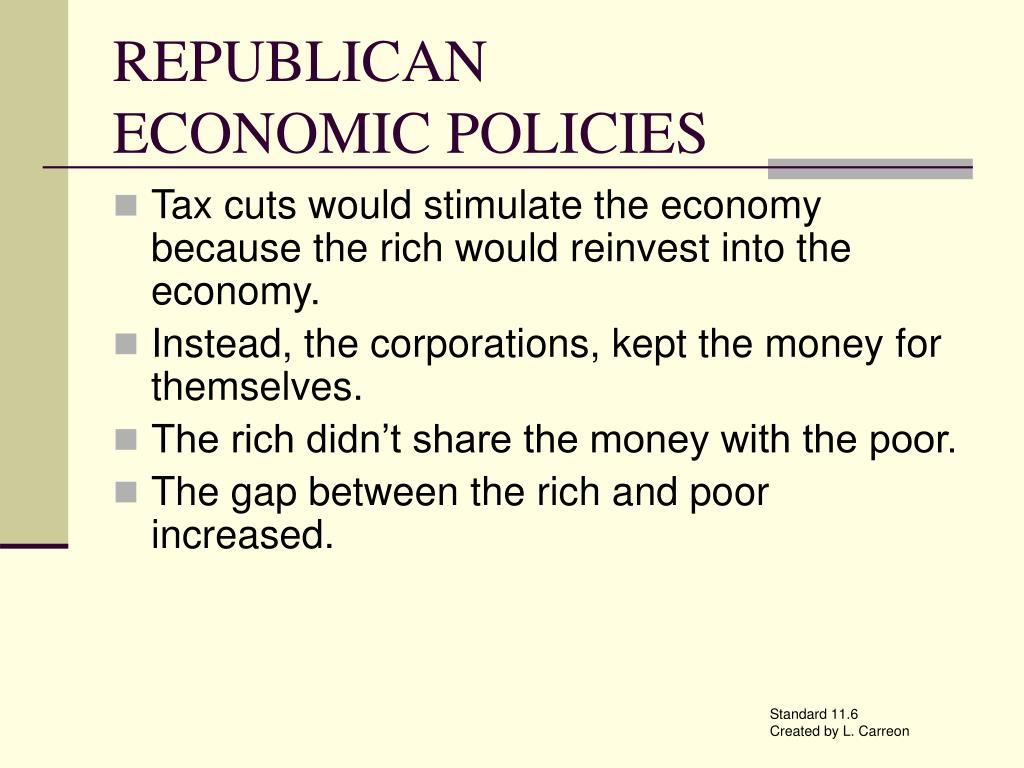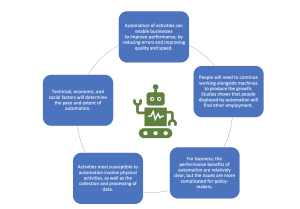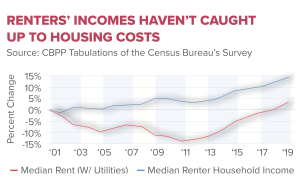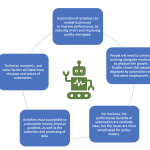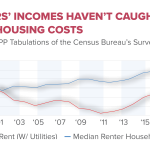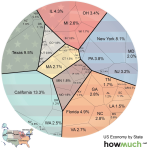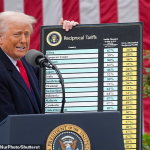Republican economic policies have long been a cornerstone of the GOP’s platform, deeply influencing how Americans perceive the economy and the role of government. Historically, these policies encompass a range of strategies aimed at promoting free-market principles and empowering workers, as highlighted by economist Oren Cass. His critiques of traditional GOP economic orthodoxy reveal a growing realization that past approaches may not have effectively served American households, leading to stagnant wages and rising trade deficits. As conservative economists question the narrow focus on deregulation and unrestrained trade, there is a burgeoning conversation about the need for a renewed emphasis on worker empowerment and the social fabric of the economy. This shift represents a pivotal evolution within Republican economic discourse, suggesting that future policies may need to strike a balance between free-market efficiency and the welfare of the working class.
The fiscal strategies associated with the Republican Party, often framed as conservative economics, are undergoing a significant reevaluation in today’s political climate. Recent discussions have spotlighted alternative economic frameworks that emphasize not just market efficiency but also worker welfare and domestic investment. Influential voices like Oren Cass are rekindling a discourse on how the so-called economic orthodoxy, long dominated by libertarian ideals, may fail to address the complexities of modern economic challenges. This emerging perspective advocates for a reevaluation of policies traditionally associated with the GOP, pushing for an approach that fosters an inclusive economy. As the political landscape shifts, it becomes increasingly vital for conservatives to consider how their economic policies can truly benefit the American workforce.
Republican Economic Policies: A Historical Overview
Republican economic policies have evolved significantly over the decades, often reflecting the changing dynamics of both domestic and global economies. Historically, the Republican Party has been associated with a strong pro-business stance, favoring policies that emphasize deregulation, tax cuts, and free-market principles. However, numerous Republican presidents have deviated from this stringent adherence to economic orthodoxy, opting instead for a more balanced approach that includes protective measures for American workers. For instance, figures like Abraham Lincoln and Teddy Roosevelt advocated for tariffs and regulations that supported burgeoning domestic industries and protected U.S. jobs from foreign competition.
The modern interpretation of Republican economic policies is increasingly under scrutiny, particularly from conservative thinkers such as Oren Cass. Cass argues that the long-held belief in unrestrained free-market capitalism has led to adverse outcomes for average American families, with stagnant wages, growing trade deficits, and an increased dependence on government assistance programs. This growing critique calls into question whether the GOP should continue to champion what many view as outdated economic orthodoxy, suggesting instead a return to principles that prioritize worker empowerment and a robust domestic economy.
The Shift from Free-Market Policies to Worker Empowerment
As Oren Cass points out, the recent shift in Republican discourse towards worker empowerment signifies a significant ideological transformation within the party. Traditionally, free-market policies emphasized consumer choice and low prices over worker well-being. However, Cass advocates for a paradigm shift that recognizes the need for economic policies that foster job growth, support family structures, and strengthen the social fabric of the country. This increasing recognition of worker issues among conservative policymakers reflects a broader consensus that transcends traditional partisan lines.
The growing alignment between some conservative leaders and progressive advocates highlights a common understanding of the struggles facing the American workforce. As Marco Rubio and J.D. Vance echo sentiments similar to those expressed by figures such as Bernie Sanders and Elizabeth Warren, a new narrative emerges: one that seeks to balance the benefits of free-market initiatives with meaningful support for workers. This evolving conversation acknowledges that while free markets can drive innovation and growth, they must also ensure that the fruits of economic prosperity are accessible to all, reinforcing the legitimacy of calls for policies that promote worker empowerment.
GOP Economic Orthodoxy vs. Progressive Economic Solutions
The prevailing GOP economic orthodoxy has long promoted a vision of unrestrained market growth, predicated on minimal government intervention. However, the effectiveness of this approach has come into question as the realities of stagnating wages and a shrinking middle class become increasingly apparent. Oren Cass urges a reevaluation of this orthodoxy, advocating for economic solutions that focus not solely on growth metrics such as GDP but also on the quality of life for American families. This fundamental shift recognizes that sustainable economic health must prioritize the needs of workers and their communities.
Opponents of the traditional GOP economic stance argue that solutions proposed by progressive economists — such as increased labor rights, stronger safety nets, and investment in human capital — could potentially align with Republican values. By integrating progressive economic solutions into the GOP framework, a more holistic approach to national prosperity can be developed, which emphasizes both market efficiency and worker dignity. This blended perspective could pave the way for a modern conservative economic doctrine that resonates with the values and needs of today’s voter base.
Lessons from Historical Republican Economies
Historical analysis showcases that many successful Republican presidents incorporated protective measures into their economic strategies, contrary to the rigid application of free-market principles seen in the last few decades. Figures like Richard Nixon and Ronald Reagan, despite their strong pro-business reputations, enacted policies that provided tangible support to American industries and workers. For instance, Reagan’s implementation of agricultural assistance programs, often overlooked in discussions of his economic legacy, reveals the complexities behind his market-oriented policies.
Moreover, these historical precedents highlight that responding to economic challenges with a nuanced understanding of labor needs is not new for the Republican Party. By revisiting the efficacy of past interventions and learning from them, today’s policymakers can better navigate the complex economic landscape while fulfilling their duty to create a more equitable society. This reexamination of history urges contemporary conservatives to rethink the unwavering loyalty to free-market purism, fostering a more balanced approach that recognizes the strength of a well-supported workforce.
Conservative Economist Oren Cass: Redefining the Market
Oren Cass’s critical assessment of free-market economics challenges long-standing assumptions about the nature and purpose of the market itself. He argues that the market should not be viewed merely as an entity for maximizing consumption but as a crucial mechanism for empowering workers. According to Cass, the focus should shift from merely facilitating transactions to fostering an economic environment that nurtures families and communities, ensuring that economic growth translates into improved living standards for all.
By encouraging a redefining of market purposes, Cass invokes a broader dialogue about the role of government and policymakers in shaping economic outcomes. He contends that responsible governance involves creating frameworks that support institutional stability and facilitate productive economic engagement without stifling individual initiative. As this conversation progresses within conservative circles, it holds profound implications for future Republican economic strategies that could embrace both market principles and worker-centric policies.
The Irony of Reaganomics and Market Fundamentalism
Reaganomics, often heralded as the cornerstone of conservative economic thought, presents an ironic contradiction when examined through the lens of modern economic challenges. While often associated with deregulation and tax cuts, Oren Cass points out that Reagan himself implemented numerous policies that reveal a more pragmatic approach to governance than commonly perceived. For instance, multiple tax increases and a commitment to agricultural support initiatives demonstrate Reagan’s recognition of the need to balance market forces with the realities faced by American workers.
This nuance in Reagan’s policies calls into question the application of market fundamentalism that has emerged in recent decades. By stripping down economic concerns to a singular focus on deregulation and libertarian principles, contemporary conservative thought has overlooked the importance of supporting the workforce and investing in domestic industries. Through this lens, Cass advocates for a return to a more balanced approach that acknowledges the government’s role in fostering a flourishing economy while reaffirming the Republican commitment to free enterprise.
The Coalition Crisis: Republicans at a Crossroads
The fragmentation of the traditional Republican coalition — previously a unified front of social conservatives, economic libertarians, and national security proponents — underscores the party’s current identity crisis. As Oren Cass indicates, the 1989 collapse of the Cold War paradigm left these factions grappling for cohesion, with each segment increasingly prioritizing its own agenda. This dissolution has culminated in a party environment where libertarian economic principles dominate, often at the expense of broader conservative values centered around community and family.
Moving forward, Republicans face the challenge of rekindling their coalition by recognizing the legitimacy of worker concerns within the free-market framework. By addressing the alienation felt by social conservatives who have witnessed their priorities sidelined for libertarian ideals, GOP leaders have the opportunity to rebuild a coalition that equitably represents the diverse interests within their ranks. The solution may lie in the party’s ability to adopt a more inclusive economic strategy that respects and promotes the well-being of all Americans, not solely the affluent.
Charting a New Economic Path for Republicans
Cass’s critique of the past three decades of Republican economic policy reveals a pressing need for the party to innovate and adapt to contemporary challenges. The data illustrating the disconnection between wage growth, the trade deficit, and the reliance on government assistance highlights a critical flaw in the party’s economic messaging. As GOP members begin to prioritize policies that elevate worker empowerment and promote constructive economic investment, a new path can emerge that aligns with both their traditional conservative values and the realities facing American families.
The potential for a transformative economic agenda within the Republican Party is itself an acknowledgment of the party’s responsibility to respond to changing societal needs. By prioritizing policies that directly address the economic struggles of the average American – such as fair wages, a commitment to manufacturing jobs, and investments in education and training – the GOP has the opportunity to redefine itself as a party of progress and resilience. Embracing this new economic path may facilitate a broader connection with constituents who have felt unheard and overlooked in recent years.
The Future of Conservative Economics: Balancing Ideals with Reality
Looking ahead, the future of conservative economics hinges on a delicate balance between ideological purity and pragmatic realities. As articulated by voices like Oren Cass, the Republican Party must reassess the implications of market fundamentalism that prioritizes market forces over viable solutions for worker empowerment. This approach may not only help the party regain relevance amidst changing economic circumstances but also reshape the political narrative that resonates with a wider audience, including younger voters.
In order to foster sustainable economic growth that benefits all Americans, it is essential for conservative policymakers to advocate for practical measures that support both free enterprise and the workforce. This may involve championing policies that enhance productivity through education, innovation, and a commitment to fair labor practices. By navigating this intersection of ideals and reality, the GOP can position itself as a thoughtful leader in economic discourse, capable of bridging current divides and addressing the pressing concerns of its constituents.
Frequently Asked Questions
What are the core principles of GOP economic orthodoxy?
GOP economic orthodoxy emphasizes free-market policies, prioritizing minimal government intervention to promote economic growth. This philosophy argues for deregulation, low taxes, and supporting businesses to stimulate entrepreneurship and job creation. However, the conversation around economic policies is evolving, with voices like economist Oren Cass advocating for a more nuanced approach that includes enhancing the workforce and empowerment of workers.
How have Republican economic policies changed over the years?
Republican economic policies have shifted significantly over the years. Historically, Republican presidents like Abraham Lincoln and Richard Nixon supported protectionist measures, while recent policies have leaned towards deregulation and free-market orthodoxy. Critics, including Oren Cass, argue that this shift has failed to address issues like wage stagnation and has led to increased reliance on government assistance, highlighting the need for a reevaluation of the GOP’s economic strategies.
What is the relationship between conservative economics and worker empowerment?
Conservative economics traditionally focuses on free-market principles, but recent discussions, particularly led by figures like Oren Cass, emphasize the importance of worker empowerment within this framework. The idea is to create an economy that not only prioritizes profits but also ensures that workers can secure good jobs and support their families, fostering a healthy economy that promotes social wellbeing.
How did Ronald Reagan’s policies influence modern Republican economic strategies?
Ronald Reagan’s presidency is often associated with free-market policies, yet he enacted several protections for domestic industries and increased government spending in areas like agriculture. These complexities challenge the notion of strict adherence to GOP economic orthodoxy and suggest that modern strategies could benefit from a balance between free-market principles and support for American workers, as argued by economists like Oren Cass.
What criticisms do conservatives have about current GOP economic orthodoxy?
Conservatives, including Oren Cass, criticize the current GOP economic orthodoxy for its singular focus on deregulation and free-market policies that have not translated into tangible benefits for the average American. They argue this approach has contributed to problems such as wage stagnation, trade deficits, and increased reliance on government assistance, advocating instead for policies that empower workers and promote domestic investment.
How do free-market policies impact American households?
Free-market policies, while aimed at enhancing consumer choice and economic efficiency, have had mixed results for American households. Critics argue that the emphasis on deregulation and low prices has led to wage stagnation and increased reliance on government support. Oren Cass highlights these issues, suggesting a need for economic reform that prioritizes worker empowerment and the creation of sustainable jobs.
What lessons can be learned from past Republican administrations regarding economic policy?
Past Republican administrations, such as those led by Lincoln and Nixon, taught valuable lessons about the importance of balancing free-market policies with protections for domestic industries and workers. As Oren Cass points out, understanding this historical context can inform current and future GOP economic strategies by integrating worker-focused policies that enhance economic prosperity for all.
What is the significance of Oren Cass’s perspective on GOP economic policy?
Oren Cass’s perspective on GOP economic policy is significant as it challenges traditional free-market orthodoxy, advocating for a renewed focus on worker empowerment and the social fabric of the economy. His ideas resonate with a younger cohort of conservatives and suggest a shift towards policies that aim not only for economic growth but also for the wellbeing of the workforce, promoting a broader understanding of prosperity.
How do Republican economic policies address the challenge of wage stagnation?
Republican economic policies have traditionally focused on tax cuts and deregulation to spur growth, yet these approaches have not effectively addressed wage stagnation. Critics, such as Oren Cass, argue that without a renewed emphasis on worker empowerment, skills development, and domestic investment, GOP policies will continue to fall short in revitalizing wage growth for American households.
In what ways can Republican policies evolve to better support American workers?
Republican policies can evolve to better support American workers by incorporating strategies that prioritize workforce development, invest in domestic industries, and create a regulatory environment conducive to job growth. By moving beyond a sole focus on deregulation and consumer prices, and embracing principles of worker empowerment and sustainable economic growth, the GOP can address the contemporary challenges faced by American families.
| Key Point | Description |
|---|---|
| Historical Context | Republican presidents historically deviated from expected GOP economic policies, favoring workforce enhancements over pure deregulation. |
| Economic Policy Critique | Deregulation and unrestricted trade, favored in the late 20th and early 21st centuries, did not yield success for American households. |
| Reaganism | Although celebrated for free-market policies, Reagan’s administration also increased taxes and provided significant governmental assistance. |
| Division of Coalition | The Republican coalition fractured post-Cold War, allowing libertarians to dominate economic policies, sidelining social conservatives. |
| Dependence on Welfare | Cass noted an increasing American reliance on government assistance, which he argues is unsustainable for social and economic health. |
| Purpose of the Market | Cass argues that the market should empower workers and strengthen community, not just maximize consumption. |
Summary
Republican economic policies have historically been inconsistent, with many presidents diverging from traditional GOP orthodoxy to support effective workforce development. As pointed out by economist Oren Cass, the free-market principles that once guided the party have often failed to serve the American middle-class effectively. Instead of focusing solely on deregulation and trade, a renewed emphasis on building a sustainable economy that empowers workers and supports families is crucial. The current discourse suggests a need for a re-evaluation of existing economic strategies to ensure they align more closely with the realities and challenges faced by everyday Americans.
